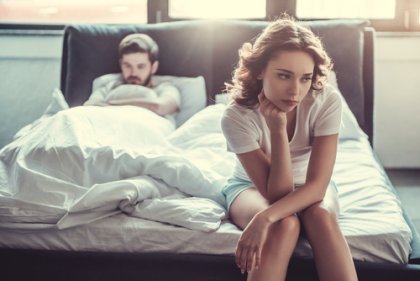Sexual Anxiety, When Intimacy Scares You

Nowadays, there’s supposedly sexual freedom and no taboos. And we say “supposedly” because, when it comes down to it, this isn’t really the truth. At least not for an important group of people who don’t enjoy intimacy. Some of them don’t enjoy it due to sexual anxiety.
When we speak of sexual anxiety we refer to a set of unpleasant emotions and feelings that have a common background scenario: sexual relations. They include fear, tension, rejection and, finally, dysfunctions. There are many reasons for it, but its effects are always very difficult to cope with.
“Eroticism is one of the basic means of self-knowledge, as indispensable as poetry.”
–Anaïs Nin-
Sex enriches life. It offers very important emotional and physical benefits. These benefits range from a stronger circulatory and immunological system to reducing stress. It has been said that it’s a natural pain-reliever and that it also has a wonderful potential to enhance our self-esteem.
However, when there’s sexual anxiety, people hardly find these benefits in sex. Hence, once the negative dynamic is established, any situation of physical intimacy causes restlessness and nervousness. There’s no enjoyment, only fear. There’s only a feeling of emptiness and dissatisfaction.
What’s the origin of sexual anxiety?
Sexual anxiety can come from different sources. Occasionally, it may be born from traumatic abuse. Sexual abuse is more frequent than people believe, partly because many victims don’t speak up. On the other hand, this is a taboo subject that was always covered up because no one was willing to report it.
When someone is abused at a very young age, they usually have very few emotional resources to manage their emotions. Therefore, it’s possible that the experience ends up leaving deeper scars and undesirable effects that will be more difficult to deal with in the future.

Possible sources
Sometimes the situation isn’t so extreme. Sometimes sexual anxiety comes from other sources. In almost all of them, the common element is repression, just like these cases:
- A restrictive education that condemns sex. There are many ideological and religious approaches that condemn sexual practices. They make sex seem despicable, dirty, or immoral. People who’ve been educated within those parameters have to work hard to discover the beautiful and pleasant facets of sexuality.
- Lack of information. Sometimes inhibition and sexual anxiety come from the lack of information regarding sex the person has. For that person, sex is an unknown world that they rather avoid.
- Fear of failure. The fear of not having an adequate performance appears when there’s a lack of experience and, therefore, knowledge. The truth is that each of us has our own definition of “adequate performance”. We may have unrealistic expectations that may lead to sexual anxiety.
There are other factors that can affect, such as depression, lack of self-esteem, or difficulty in accepting our own body. Unresolved conflicts and damaged trust will make anxiety worse.
What to do when faced with sexual anxiety?
In many cases, sexual anxiety ends up giving way to sexual dysfunction: decreased desire, difficulty feeling excitement, premature ejaculation, or pain during intercourse. All this impoverishes the couple’s sex life and relationship if not dealt with.

Here’s what you should do in case of sexual anxiety:
- Strengthening your emotional relationship with your partner. Nothing is more liberating than increasing trust as a couple. Create the conditions so that you can talk about the topic with total sincerity, with the aim of finding solutions.
- Educate yourself. It’s very important to know your own body well. In this case, we’re referring to the anatomy of your sexual organs and their functioning. It’s also important to understand what happens during a sexual relationship, both physically and psychologically. Reading or learning more about the subject helps reduce fears.
- Boost eroticism. Sexuality is so much more than intercourse. That’s why it’s necessary to give importance to everything that promotes eroticism. This includes caresses, kisses, massages, and all other displays of affection.
- Discover what relaxes you. Each person is different and there are no rules in sexuality, other than the ones the couple set. In this sense, it’s useful to discover what makes you comfortable during sex. For example, the light level that makes you both feel comfortable, the time, the place, etc.
When to get help

Finally, keep in mind that there are different kinds of sexual anxiety. Some demand professional help. In others, a change of circumstances can redirect the situation. In one way or another, if you’re in this situation and don’t know what to do about it, it’s best to go see a specialist. You should first see your doctor so that they can rule out any physical problem or if what you’re suffering is the side effect of a medication.
If you already saw your doctor and ruled those things out, it’s best to go to a psychologist. If anxiety is causing the dysfunction, the professional will design an intervention plan adapted to your needs that will undoubtedly help you.
This text is provided for informational purposes only and does not replace consultation with a professional. If in doubt, consult your specialist.








